Reflective Essay on Nursing and Care: Personal Reflections
VerifiedAdded on 2022/10/11
|9
|1988
|27
Essay
AI Summary
This reflective essay explores the student's personal experiences in nursing, focusing on the application of care theories and their impact on patient outcomes. The essay begins with a detailed account of a challenging situation in the emergency department, highlighting the importance of person-centered care, effective communication, and informed consent. The student reflects on the value of Jean Watson's carative theory and the need for evidence-based practice, including addressing issues like alarm fatigue. The essay also discusses an experience in geriatric care, emphasizing the importance of ethical and professional relationships, and the development of individualized treatment plans. The student concludes by emphasizing the importance of understanding the service seeker's circumstances and creating a person-centered plan, while constantly staying updated on medical reports and following evidence-based practices. The essay underscores the significance of respecting individual differences, maintaining professional boundaries, and continually improving caregiving skills.
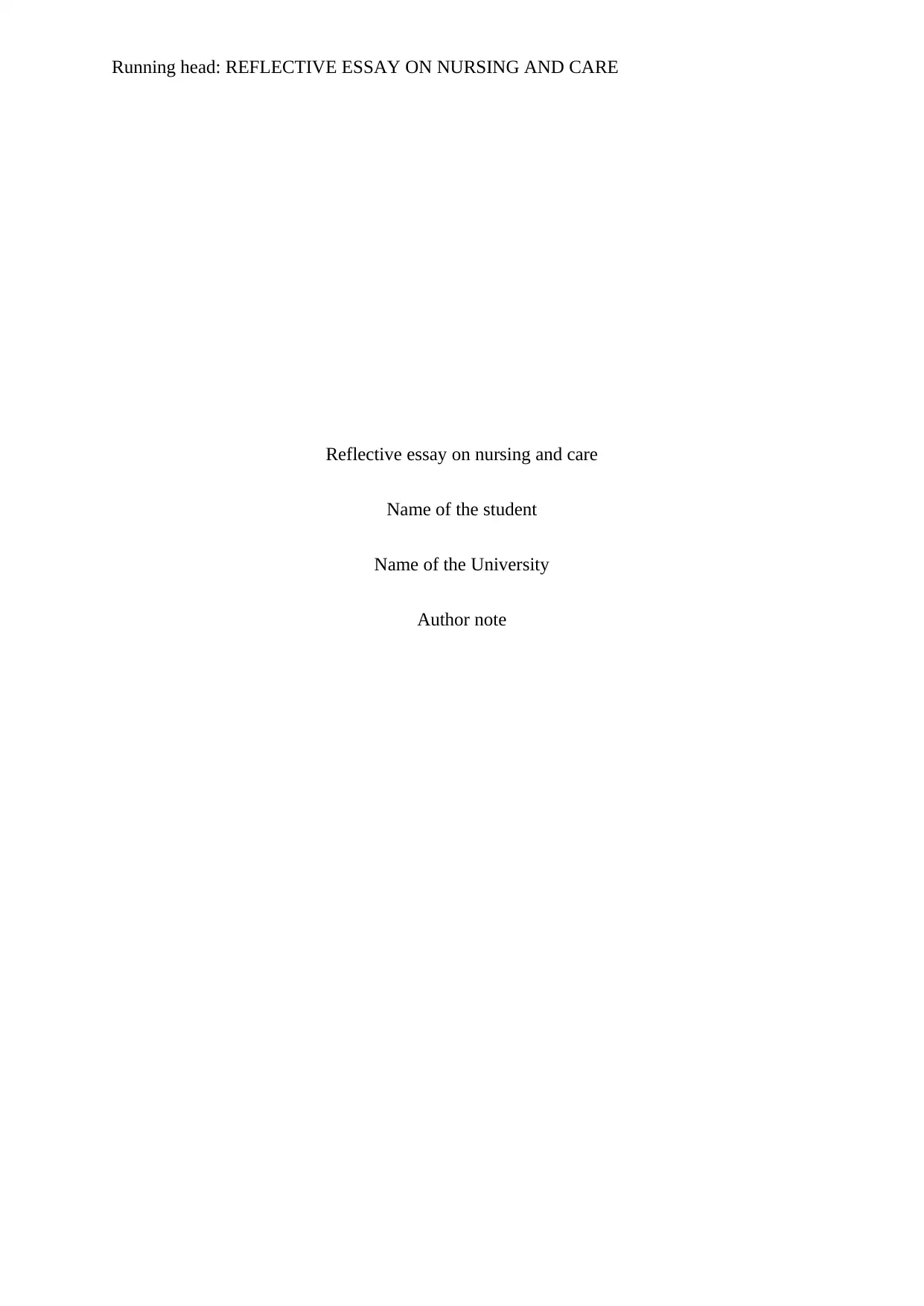
Running head: REFLECTIVE ESSAY ON NURSING AND CARE
Reflective essay on nursing and care
Name of the student
Name of the University
Author note
Reflective essay on nursing and care
Name of the student
Name of the University
Author note
Paraphrase This Document
Need a fresh take? Get an instant paraphrase of this document with our AI Paraphraser
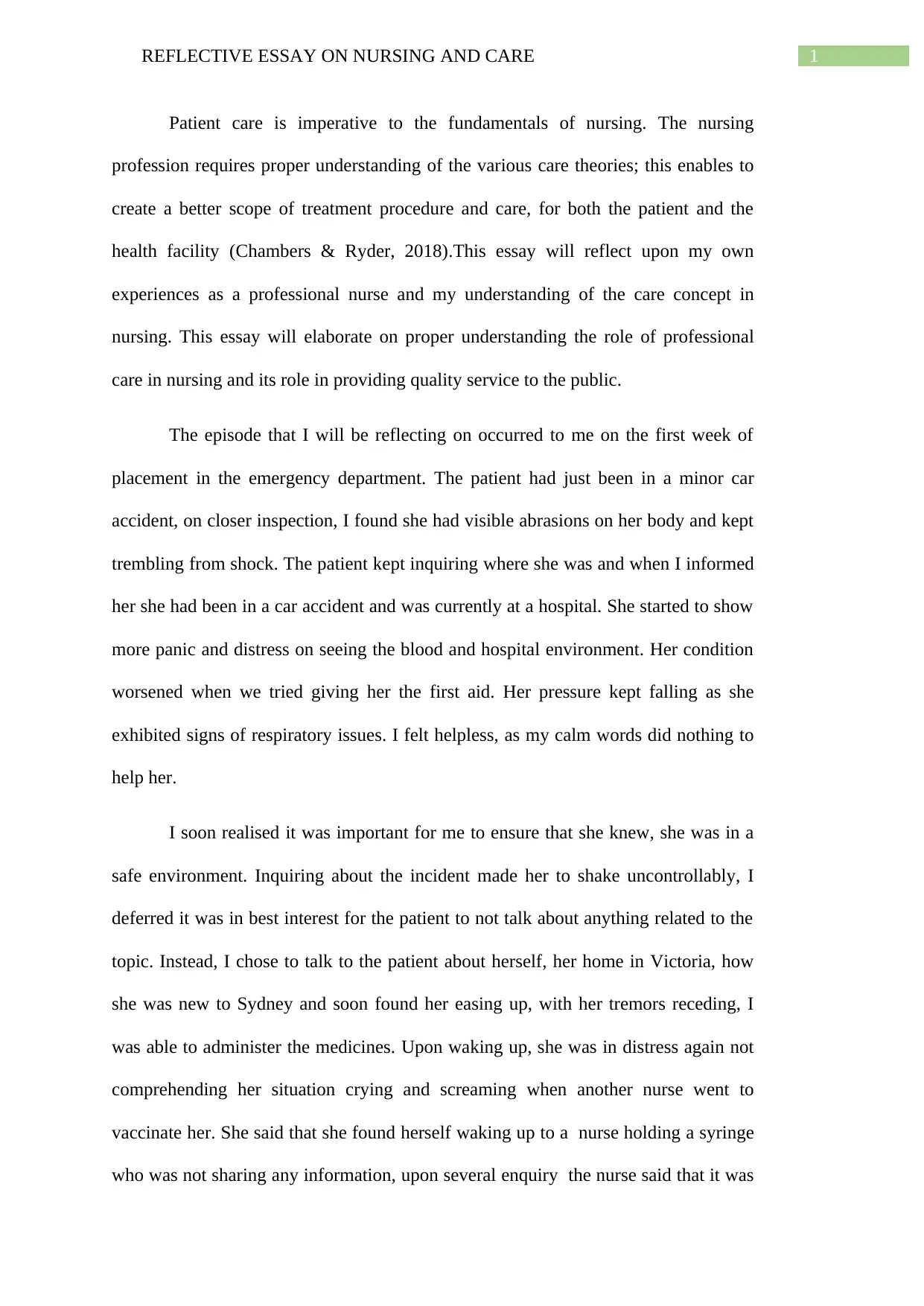
1REFLECTIVE ESSAY ON NURSING AND CARE
Patient care is imperative to the fundamentals of nursing. The nursing
profession requires proper understanding of the various care theories; this enables to
create a better scope of treatment procedure and care, for both the patient and the
health facility (Chambers & Ryder, 2018).This essay will reflect upon my own
experiences as a professional nurse and my understanding of the care concept in
nursing. This essay will elaborate on proper understanding the role of professional
care in nursing and its role in providing quality service to the public.
The episode that I will be reflecting on occurred to me on the first week of
placement in the emergency department. The patient had just been in a minor car
accident, on closer inspection, I found she had visible abrasions on her body and kept
trembling from shock. The patient kept inquiring where she was and when I informed
her she had been in a car accident and was currently at a hospital. She started to show
more panic and distress on seeing the blood and hospital environment. Her condition
worsened when we tried giving her the first aid. Her pressure kept falling as she
exhibited signs of respiratory issues. I felt helpless, as my calm words did nothing to
help her.
I soon realised it was important for me to ensure that she knew, she was in a
safe environment. Inquiring about the incident made her to shake uncontrollably, I
deferred it was in best interest for the patient to not talk about anything related to the
topic. Instead, I chose to talk to the patient about herself, her home in Victoria, how
she was new to Sydney and soon found her easing up, with her tremors receding, I
was able to administer the medicines. Upon waking up, she was in distress again not
comprehending her situation crying and screaming when another nurse went to
vaccinate her. She said that she found herself waking up to a nurse holding a syringe
who was not sharing any information, upon several enquiry the nurse said that it was
Patient care is imperative to the fundamentals of nursing. The nursing
profession requires proper understanding of the various care theories; this enables to
create a better scope of treatment procedure and care, for both the patient and the
health facility (Chambers & Ryder, 2018).This essay will reflect upon my own
experiences as a professional nurse and my understanding of the care concept in
nursing. This essay will elaborate on proper understanding the role of professional
care in nursing and its role in providing quality service to the public.
The episode that I will be reflecting on occurred to me on the first week of
placement in the emergency department. The patient had just been in a minor car
accident, on closer inspection, I found she had visible abrasions on her body and kept
trembling from shock. The patient kept inquiring where she was and when I informed
her she had been in a car accident and was currently at a hospital. She started to show
more panic and distress on seeing the blood and hospital environment. Her condition
worsened when we tried giving her the first aid. Her pressure kept falling as she
exhibited signs of respiratory issues. I felt helpless, as my calm words did nothing to
help her.
I soon realised it was important for me to ensure that she knew, she was in a
safe environment. Inquiring about the incident made her to shake uncontrollably, I
deferred it was in best interest for the patient to not talk about anything related to the
topic. Instead, I chose to talk to the patient about herself, her home in Victoria, how
she was new to Sydney and soon found her easing up, with her tremors receding, I
was able to administer the medicines. Upon waking up, she was in distress again not
comprehending her situation crying and screaming when another nurse went to
vaccinate her. She said that she found herself waking up to a nurse holding a syringe
who was not sharing any information, upon several enquiry the nurse said that it was
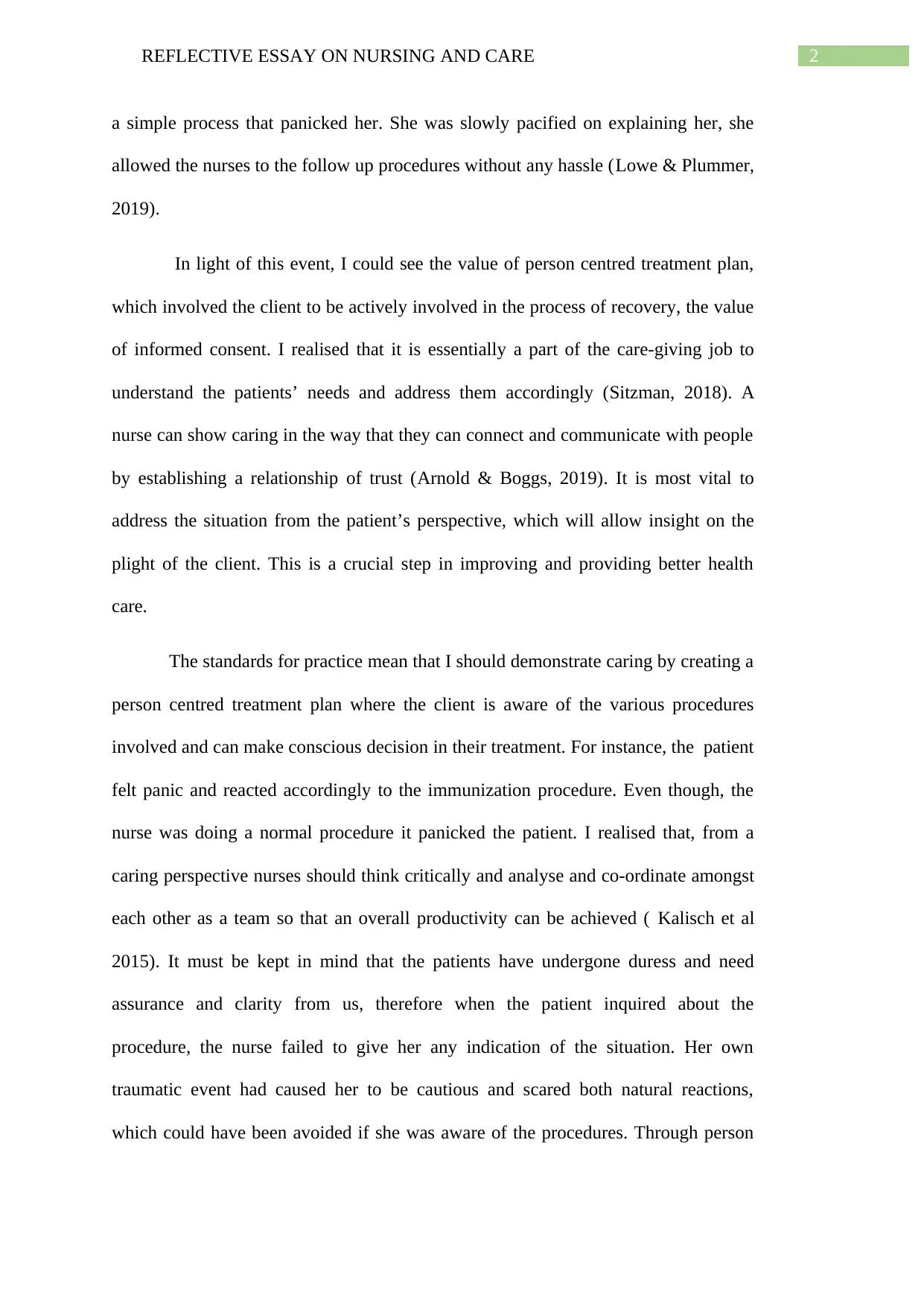
2REFLECTIVE ESSAY ON NURSING AND CARE
a simple process that panicked her. She was slowly pacified on explaining her, she
allowed the nurses to the follow up procedures without any hassle (Lowe & Plummer,
2019).
In light of this event, I could see the value of person centred treatment plan,
which involved the client to be actively involved in the process of recovery, the value
of informed consent. I realised that it is essentially a part of the care-giving job to
understand the patients’ needs and address them accordingly (Sitzman, 2018). A
nurse can show caring in the way that they can connect and communicate with people
by establishing a relationship of trust (Arnold & Boggs, 2019). It is most vital to
address the situation from the patient’s perspective, which will allow insight on the
plight of the client. This is a crucial step in improving and providing better health
care.
The standards for practice mean that I should demonstrate caring by creating a
person centred treatment plan where the client is aware of the various procedures
involved and can make conscious decision in their treatment. For instance, the patient
felt panic and reacted accordingly to the immunization procedure. Even though, the
nurse was doing a normal procedure it panicked the patient. I realised that, from a
caring perspective nurses should think critically and analyse and co-ordinate amongst
each other as a team so that an overall productivity can be achieved ( Kalisch et al
2015). It must be kept in mind that the patients have undergone duress and need
assurance and clarity from us, therefore when the patient inquired about the
procedure, the nurse failed to give her any indication of the situation. Her own
traumatic event had caused her to be cautious and scared both natural reactions,
which could have been avoided if she was aware of the procedures. Through person
a simple process that panicked her. She was slowly pacified on explaining her, she
allowed the nurses to the follow up procedures without any hassle (Lowe & Plummer,
2019).
In light of this event, I could see the value of person centred treatment plan,
which involved the client to be actively involved in the process of recovery, the value
of informed consent. I realised that it is essentially a part of the care-giving job to
understand the patients’ needs and address them accordingly (Sitzman, 2018). A
nurse can show caring in the way that they can connect and communicate with people
by establishing a relationship of trust (Arnold & Boggs, 2019). It is most vital to
address the situation from the patient’s perspective, which will allow insight on the
plight of the client. This is a crucial step in improving and providing better health
care.
The standards for practice mean that I should demonstrate caring by creating a
person centred treatment plan where the client is aware of the various procedures
involved and can make conscious decision in their treatment. For instance, the patient
felt panic and reacted accordingly to the immunization procedure. Even though, the
nurse was doing a normal procedure it panicked the patient. I realised that, from a
caring perspective nurses should think critically and analyse and co-ordinate amongst
each other as a team so that an overall productivity can be achieved ( Kalisch et al
2015). It must be kept in mind that the patients have undergone duress and need
assurance and clarity from us, therefore when the patient inquired about the
procedure, the nurse failed to give her any indication of the situation. Her own
traumatic event had caused her to be cautious and scared both natural reactions,
which could have been avoided if she was aware of the procedures. Through person
⊘ This is a preview!⊘
Do you want full access?
Subscribe today to unlock all pages.

Trusted by 1+ million students worldwide
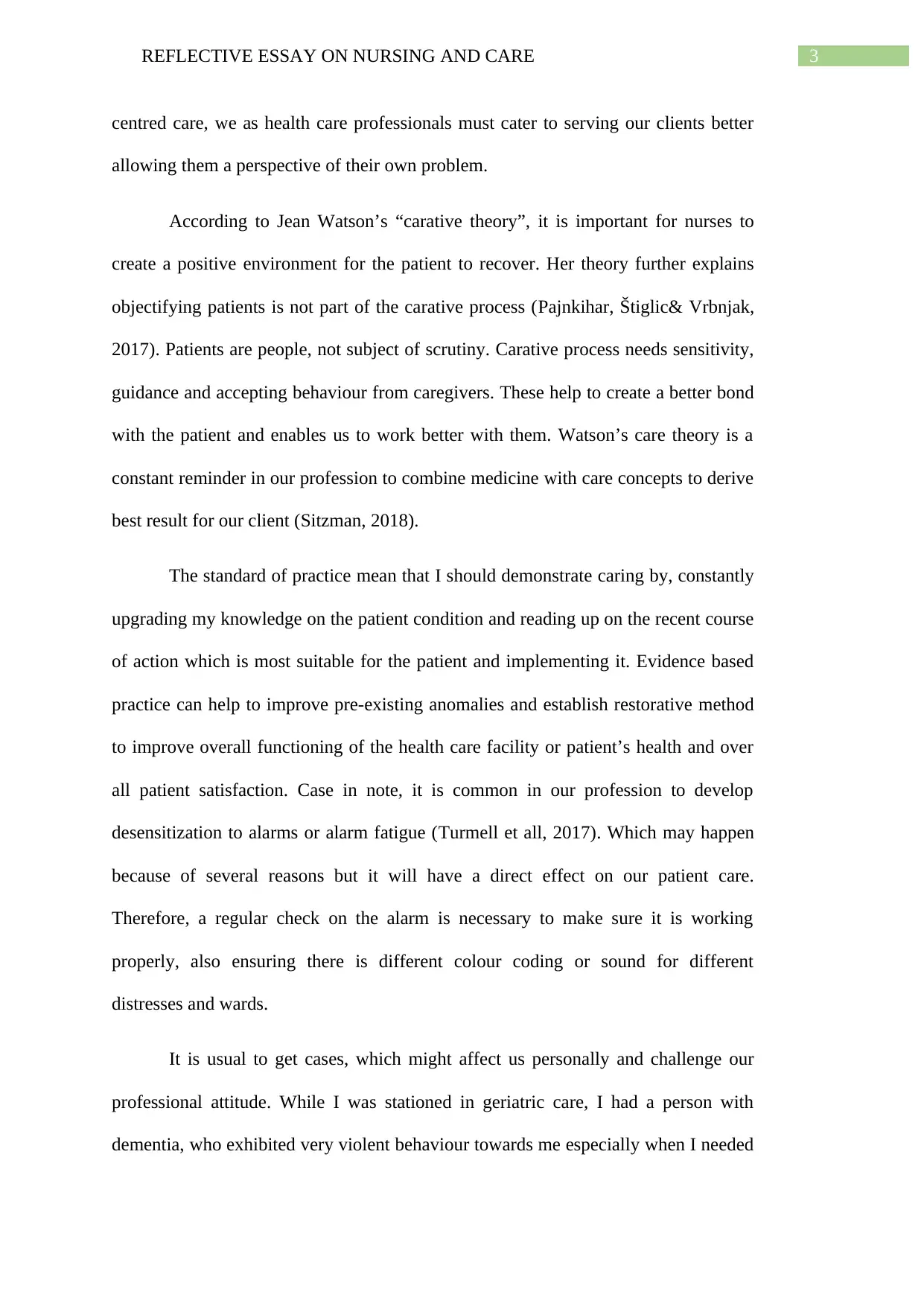
3REFLECTIVE ESSAY ON NURSING AND CARE
centred care, we as health care professionals must cater to serving our clients better
allowing them a perspective of their own problem.
According to Jean Watson’s “carative theory”, it is important for nurses to
create a positive environment for the patient to recover. Her theory further explains
objectifying patients is not part of the carative process (Pajnkihar, Štiglic& Vrbnjak,
2017). Patients are people, not subject of scrutiny. Carative process needs sensitivity,
guidance and accepting behaviour from caregivers. These help to create a better bond
with the patient and enables us to work better with them. Watson’s care theory is a
constant reminder in our profession to combine medicine with care concepts to derive
best result for our client (Sitzman, 2018).
The standard of practice mean that I should demonstrate caring by, constantly
upgrading my knowledge on the patient condition and reading up on the recent course
of action which is most suitable for the patient and implementing it. Evidence based
practice can help to improve pre-existing anomalies and establish restorative method
to improve overall functioning of the health care facility or patient’s health and over
all patient satisfaction. Case in note, it is common in our profession to develop
desensitization to alarms or alarm fatigue (Turmell et all, 2017). Which may happen
because of several reasons but it will have a direct effect on our patient care.
Therefore, a regular check on the alarm is necessary to make sure it is working
properly, also ensuring there is different colour coding or sound for different
distresses and wards.
It is usual to get cases, which might affect us personally and challenge our
professional attitude. While I was stationed in geriatric care, I had a person with
dementia, who exhibited very violent behaviour towards me especially when I needed
centred care, we as health care professionals must cater to serving our clients better
allowing them a perspective of their own problem.
According to Jean Watson’s “carative theory”, it is important for nurses to
create a positive environment for the patient to recover. Her theory further explains
objectifying patients is not part of the carative process (Pajnkihar, Štiglic& Vrbnjak,
2017). Patients are people, not subject of scrutiny. Carative process needs sensitivity,
guidance and accepting behaviour from caregivers. These help to create a better bond
with the patient and enables us to work better with them. Watson’s care theory is a
constant reminder in our profession to combine medicine with care concepts to derive
best result for our client (Sitzman, 2018).
The standard of practice mean that I should demonstrate caring by, constantly
upgrading my knowledge on the patient condition and reading up on the recent course
of action which is most suitable for the patient and implementing it. Evidence based
practice can help to improve pre-existing anomalies and establish restorative method
to improve overall functioning of the health care facility or patient’s health and over
all patient satisfaction. Case in note, it is common in our profession to develop
desensitization to alarms or alarm fatigue (Turmell et all, 2017). Which may happen
because of several reasons but it will have a direct effect on our patient care.
Therefore, a regular check on the alarm is necessary to make sure it is working
properly, also ensuring there is different colour coding or sound for different
distresses and wards.
It is usual to get cases, which might affect us personally and challenge our
professional attitude. While I was stationed in geriatric care, I had a person with
dementia, who exhibited very violent behaviour towards me especially when I needed
Paraphrase This Document
Need a fresh take? Get an instant paraphrase of this document with our AI Paraphraser
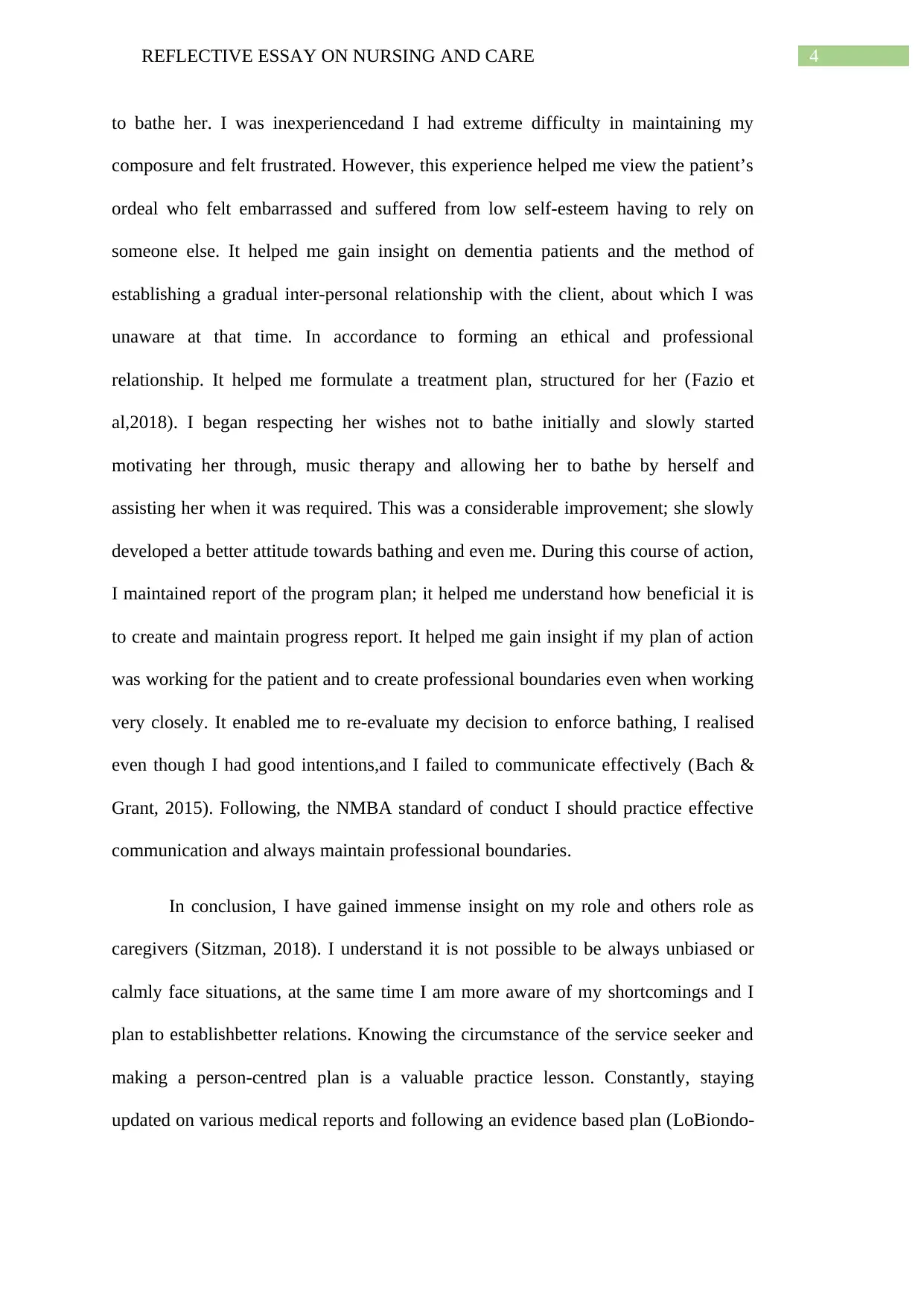
4REFLECTIVE ESSAY ON NURSING AND CARE
to bathe her. I was inexperiencedand I had extreme difficulty in maintaining my
composure and felt frustrated. However, this experience helped me view the patient’s
ordeal who felt embarrassed and suffered from low self-esteem having to rely on
someone else. It helped me gain insight on dementia patients and the method of
establishing a gradual inter-personal relationship with the client, about which I was
unaware at that time. In accordance to forming an ethical and professional
relationship. It helped me formulate a treatment plan, structured for her (Fazio et
al,2018). I began respecting her wishes not to bathe initially and slowly started
motivating her through, music therapy and allowing her to bathe by herself and
assisting her when it was required. This was a considerable improvement; she slowly
developed a better attitude towards bathing and even me. During this course of action,
I maintained report of the program plan; it helped me understand how beneficial it is
to create and maintain progress report. It helped me gain insight if my plan of action
was working for the patient and to create professional boundaries even when working
very closely. It enabled me to re-evaluate my decision to enforce bathing, I realised
even though I had good intentions,and I failed to communicate effectively (Bach &
Grant, 2015). Following, the NMBA standard of conduct I should practice effective
communication and always maintain professional boundaries.
In conclusion, I have gained immense insight on my role and others role as
caregivers (Sitzman, 2018). I understand it is not possible to be always unbiased or
calmly face situations, at the same time I am more aware of my shortcomings and I
plan to establishbetter relations. Knowing the circumstance of the service seeker and
making a person-centred plan is a valuable practice lesson. Constantly, staying
updated on various medical reports and following an evidence based plan (LoBiondo-
to bathe her. I was inexperiencedand I had extreme difficulty in maintaining my
composure and felt frustrated. However, this experience helped me view the patient’s
ordeal who felt embarrassed and suffered from low self-esteem having to rely on
someone else. It helped me gain insight on dementia patients and the method of
establishing a gradual inter-personal relationship with the client, about which I was
unaware at that time. In accordance to forming an ethical and professional
relationship. It helped me formulate a treatment plan, structured for her (Fazio et
al,2018). I began respecting her wishes not to bathe initially and slowly started
motivating her through, music therapy and allowing her to bathe by herself and
assisting her when it was required. This was a considerable improvement; she slowly
developed a better attitude towards bathing and even me. During this course of action,
I maintained report of the program plan; it helped me understand how beneficial it is
to create and maintain progress report. It helped me gain insight if my plan of action
was working for the patient and to create professional boundaries even when working
very closely. It enabled me to re-evaluate my decision to enforce bathing, I realised
even though I had good intentions,and I failed to communicate effectively (Bach &
Grant, 2015). Following, the NMBA standard of conduct I should practice effective
communication and always maintain professional boundaries.
In conclusion, I have gained immense insight on my role and others role as
caregivers (Sitzman, 2018). I understand it is not possible to be always unbiased or
calmly face situations, at the same time I am more aware of my shortcomings and I
plan to establishbetter relations. Knowing the circumstance of the service seeker and
making a person-centred plan is a valuable practice lesson. Constantly, staying
updated on various medical reports and following an evidence based plan (LoBiondo-
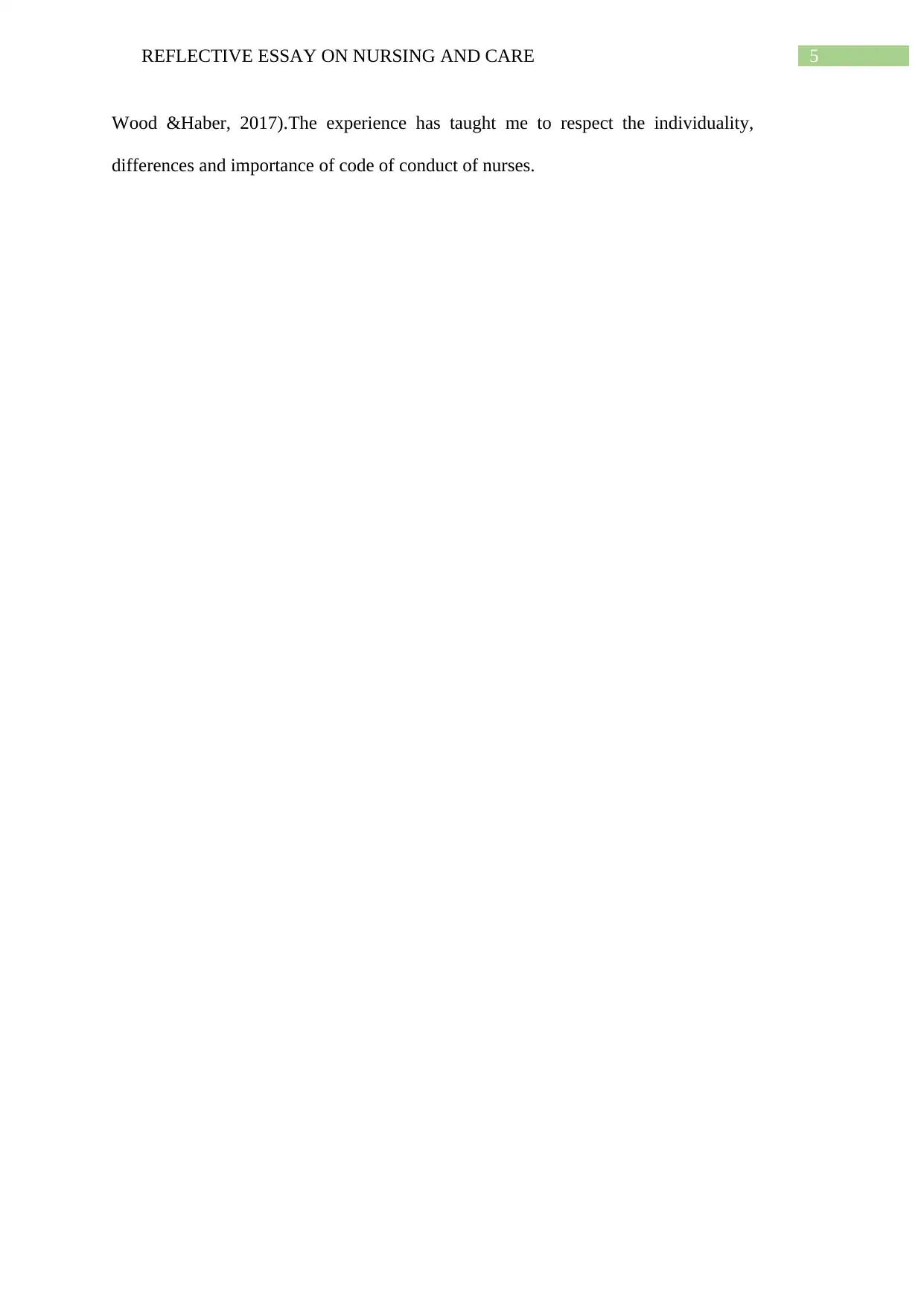
5REFLECTIVE ESSAY ON NURSING AND CARE
Wood &Haber, 2017).The experience has taught me to respect the individuality,
differences and importance of code of conduct of nurses.
Wood &Haber, 2017).The experience has taught me to respect the individuality,
differences and importance of code of conduct of nurses.
⊘ This is a preview!⊘
Do you want full access?
Subscribe today to unlock all pages.

Trusted by 1+ million students worldwide
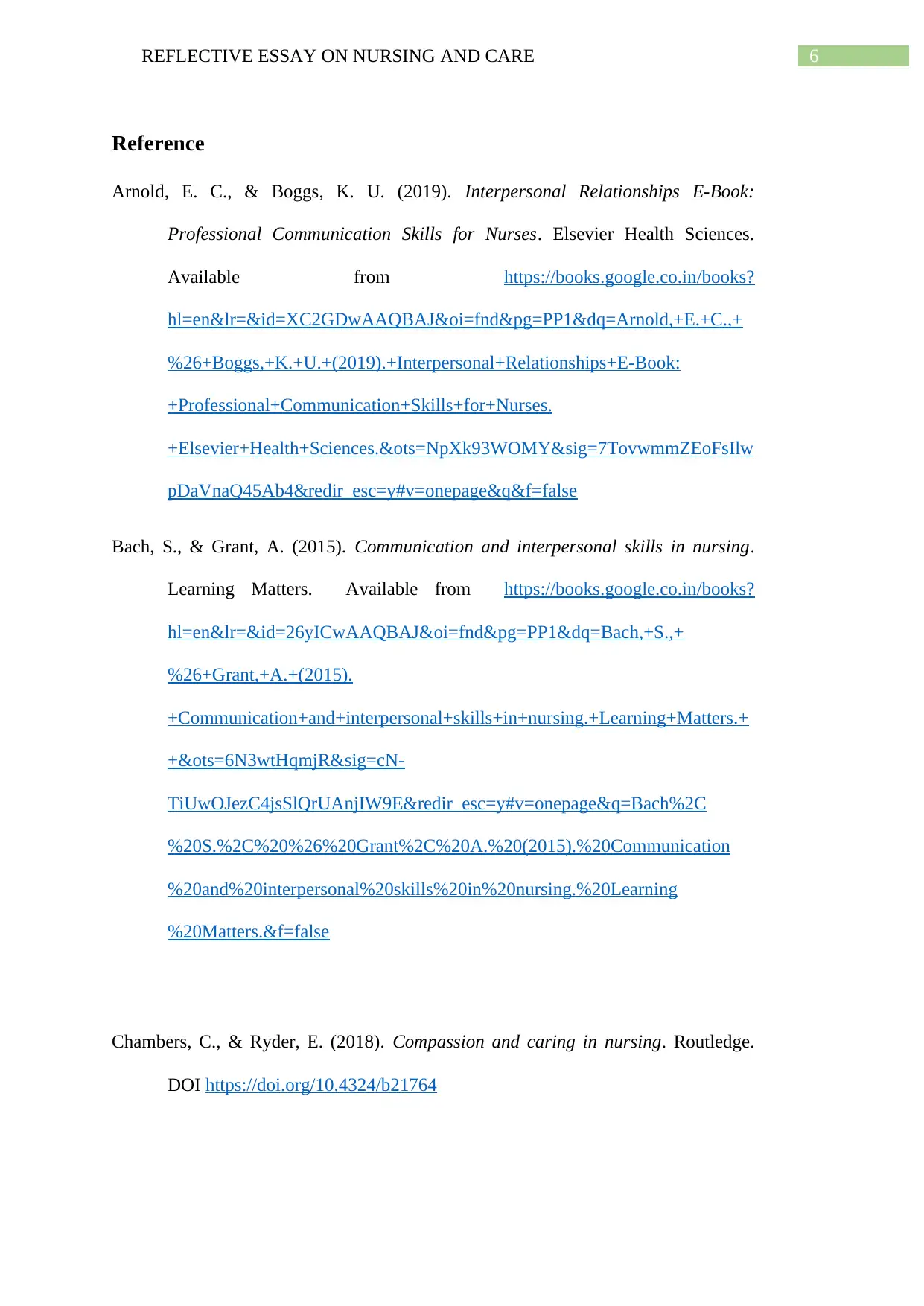
6REFLECTIVE ESSAY ON NURSING AND CARE
Reference
Arnold, E. C., & Boggs, K. U. (2019). Interpersonal Relationships E-Book:
Professional Communication Skills for Nurses. Elsevier Health Sciences.
Available from https://books.google.co.in/books?
hl=en&lr=&id=XC2GDwAAQBAJ&oi=fnd&pg=PP1&dq=Arnold,+E.+C.,+
%26+Boggs,+K.+U.+(2019).+Interpersonal+Relationships+E-Book:
+Professional+Communication+Skills+for+Nurses.
+Elsevier+Health+Sciences.&ots=NpXk93WOMY&sig=7TovwmmZEoFsIlw
pDaVnaQ45Ab4&redir_esc=y#v=onepage&q&f=false
Bach, S., & Grant, A. (2015). Communication and interpersonal skills in nursing.
Learning Matters. Available from https://books.google.co.in/books?
hl=en&lr=&id=26yICwAAQBAJ&oi=fnd&pg=PP1&dq=Bach,+S.,+
%26+Grant,+A.+(2015).
+Communication+and+interpersonal+skills+in+nursing.+Learning+Matters.+
+&ots=6N3wtHqmjR&sig=cN-
TiUwOJezC4jsSlQrUAnjIW9E&redir_esc=y#v=onepage&q=Bach%2C
%20S.%2C%20%26%20Grant%2C%20A.%20(2015).%20Communication
%20and%20interpersonal%20skills%20in%20nursing.%20Learning
%20Matters.&f=false
Chambers, C., & Ryder, E. (2018). Compassion and caring in nursing. Routledge.
DOI https://doi.org/10.4324/b21764
Reference
Arnold, E. C., & Boggs, K. U. (2019). Interpersonal Relationships E-Book:
Professional Communication Skills for Nurses. Elsevier Health Sciences.
Available from https://books.google.co.in/books?
hl=en&lr=&id=XC2GDwAAQBAJ&oi=fnd&pg=PP1&dq=Arnold,+E.+C.,+
%26+Boggs,+K.+U.+(2019).+Interpersonal+Relationships+E-Book:
+Professional+Communication+Skills+for+Nurses.
+Elsevier+Health+Sciences.&ots=NpXk93WOMY&sig=7TovwmmZEoFsIlw
pDaVnaQ45Ab4&redir_esc=y#v=onepage&q&f=false
Bach, S., & Grant, A. (2015). Communication and interpersonal skills in nursing.
Learning Matters. Available from https://books.google.co.in/books?
hl=en&lr=&id=26yICwAAQBAJ&oi=fnd&pg=PP1&dq=Bach,+S.,+
%26+Grant,+A.+(2015).
+Communication+and+interpersonal+skills+in+nursing.+Learning+Matters.+
+&ots=6N3wtHqmjR&sig=cN-
TiUwOJezC4jsSlQrUAnjIW9E&redir_esc=y#v=onepage&q=Bach%2C
%20S.%2C%20%26%20Grant%2C%20A.%20(2015).%20Communication
%20and%20interpersonal%20skills%20in%20nursing.%20Learning
%20Matters.&f=false
Chambers, C., & Ryder, E. (2018). Compassion and caring in nursing. Routledge.
DOI https://doi.org/10.4324/b21764
Paraphrase This Document
Need a fresh take? Get an instant paraphrase of this document with our AI Paraphraser
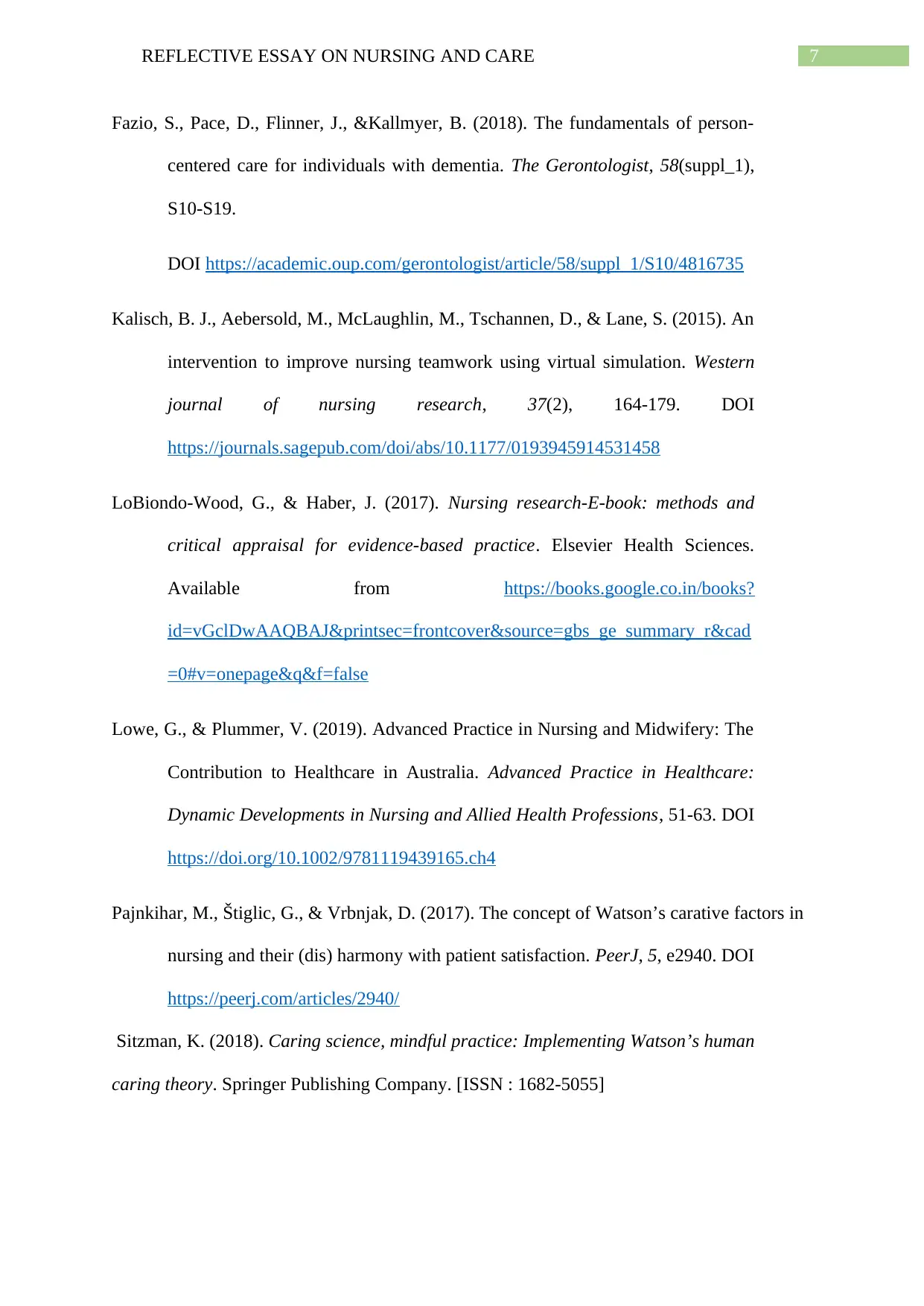
7REFLECTIVE ESSAY ON NURSING AND CARE
Fazio, S., Pace, D., Flinner, J., &Kallmyer, B. (2018). The fundamentals of person-
centered care for individuals with dementia. The Gerontologist, 58(suppl_1),
S10-S19.
DOI https://academic.oup.com/gerontologist/article/58/suppl_1/S10/4816735
Kalisch, B. J., Aebersold, M., McLaughlin, M., Tschannen, D., & Lane, S. (2015). An
intervention to improve nursing teamwork using virtual simulation. Western
journal of nursing research, 37(2), 164-179. DOI
https://journals.sagepub.com/doi/abs/10.1177/0193945914531458
LoBiondo-Wood, G., & Haber, J. (2017). Nursing research-E-book: methods and
critical appraisal for evidence-based practice. Elsevier Health Sciences.
Available from https://books.google.co.in/books?
id=vGclDwAAQBAJ&printsec=frontcover&source=gbs_ge_summary_r&cad
=0#v=onepage&q&f=false
Lowe, G., & Plummer, V. (2019). Advanced Practice in Nursing and Midwifery: The
Contribution to Healthcare in Australia. Advanced Practice in Healthcare:
Dynamic Developments in Nursing and Allied Health Professions, 51-63. DOI
https://doi.org/10.1002/9781119439165.ch4
Pajnkihar, M., Štiglic, G., & Vrbnjak, D. (2017). The concept of Watson’s carative factors in
nursing and their (dis) harmony with patient satisfaction. PeerJ, 5, e2940. DOI
https://peerj.com/articles/2940/
Sitzman, K. (2018). Caring science, mindful practice: Implementing Watson’s human
caring theory. Springer Publishing Company. [ISSN : 1682-5055]
Fazio, S., Pace, D., Flinner, J., &Kallmyer, B. (2018). The fundamentals of person-
centered care for individuals with dementia. The Gerontologist, 58(suppl_1),
S10-S19.
DOI https://academic.oup.com/gerontologist/article/58/suppl_1/S10/4816735
Kalisch, B. J., Aebersold, M., McLaughlin, M., Tschannen, D., & Lane, S. (2015). An
intervention to improve nursing teamwork using virtual simulation. Western
journal of nursing research, 37(2), 164-179. DOI
https://journals.sagepub.com/doi/abs/10.1177/0193945914531458
LoBiondo-Wood, G., & Haber, J. (2017). Nursing research-E-book: methods and
critical appraisal for evidence-based practice. Elsevier Health Sciences.
Available from https://books.google.co.in/books?
id=vGclDwAAQBAJ&printsec=frontcover&source=gbs_ge_summary_r&cad
=0#v=onepage&q&f=false
Lowe, G., & Plummer, V. (2019). Advanced Practice in Nursing and Midwifery: The
Contribution to Healthcare in Australia. Advanced Practice in Healthcare:
Dynamic Developments in Nursing and Allied Health Professions, 51-63. DOI
https://doi.org/10.1002/9781119439165.ch4
Pajnkihar, M., Štiglic, G., & Vrbnjak, D. (2017). The concept of Watson’s carative factors in
nursing and their (dis) harmony with patient satisfaction. PeerJ, 5, e2940. DOI
https://peerj.com/articles/2940/
Sitzman, K. (2018). Caring science, mindful practice: Implementing Watson’s human
caring theory. Springer Publishing Company. [ISSN : 1682-5055]
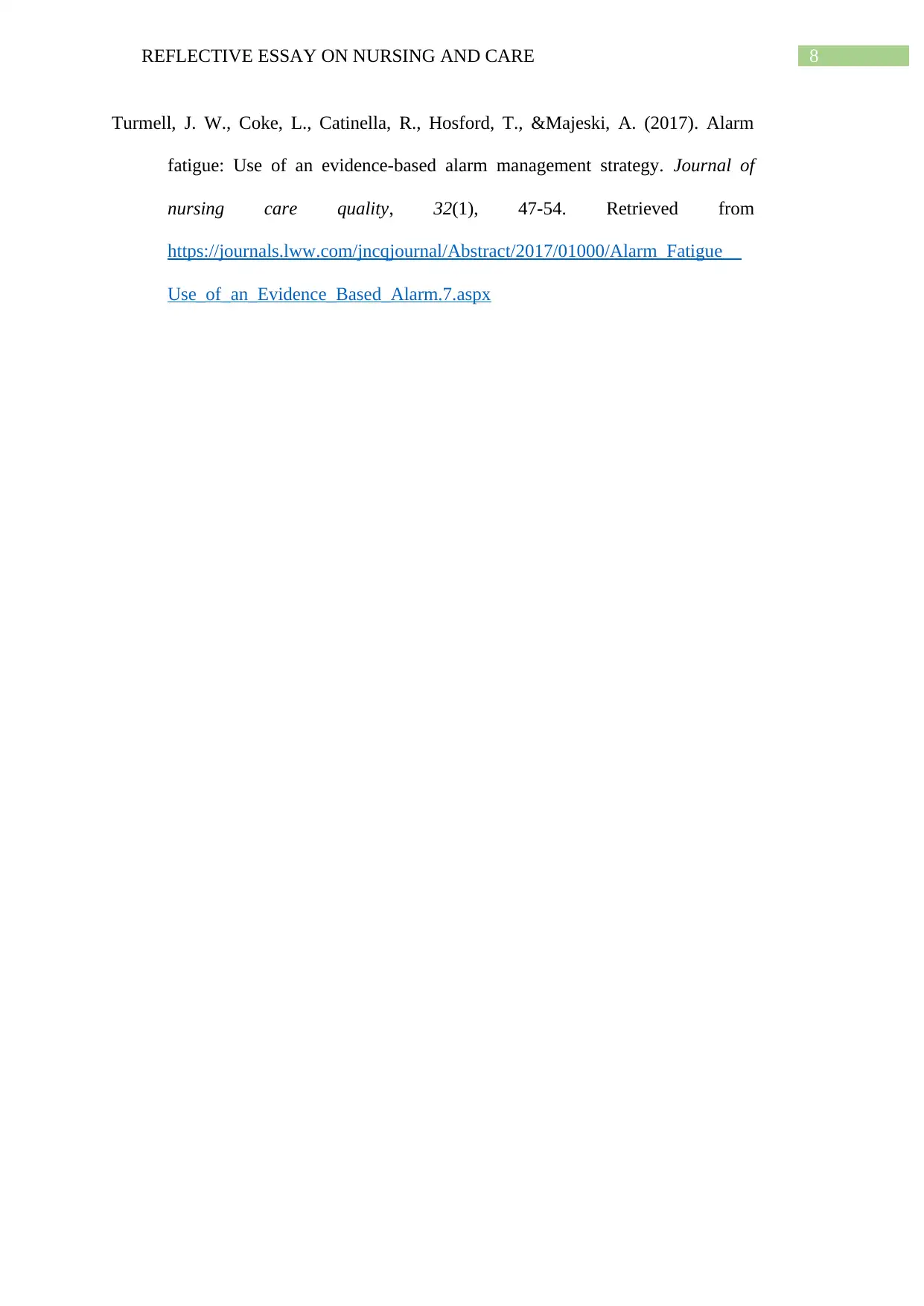
8REFLECTIVE ESSAY ON NURSING AND CARE
Turmell, J. W., Coke, L., Catinella, R., Hosford, T., &Majeski, A. (2017). Alarm
fatigue: Use of an evidence-based alarm management strategy. Journal of
nursing care quality, 32(1), 47-54. Retrieved from
https://journals.lww.com/jncqjournal/Abstract/2017/01000/Alarm_Fatigue__
Use_of_an_Evidence_Based_Alarm.7.aspx
Turmell, J. W., Coke, L., Catinella, R., Hosford, T., &Majeski, A. (2017). Alarm
fatigue: Use of an evidence-based alarm management strategy. Journal of
nursing care quality, 32(1), 47-54. Retrieved from
https://journals.lww.com/jncqjournal/Abstract/2017/01000/Alarm_Fatigue__
Use_of_an_Evidence_Based_Alarm.7.aspx
⊘ This is a preview!⊘
Do you want full access?
Subscribe today to unlock all pages.

Trusted by 1+ million students worldwide
1 out of 9
Related Documents
Your All-in-One AI-Powered Toolkit for Academic Success.
+13062052269
info@desklib.com
Available 24*7 on WhatsApp / Email
![[object Object]](/_next/static/media/star-bottom.7253800d.svg)
Unlock your academic potential
Copyright © 2020–2026 A2Z Services. All Rights Reserved. Developed and managed by ZUCOL.





